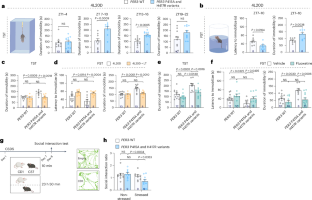Human PERIOD3 variants lead to winter depression-like behaviours via glucocorticoid signalling
IF 20.8
1区 医学
Q1 ENDOCRINOLOGY & METABOLISM
引用次数: 0
Abstract
Our brain adapts to seasonal changes. Mis-adaptations may lead to seasonal patterns in several psychiatric disorders, but we know little regarding the underlying mechanisms. Our previous work identified two variants in the human circadian clock gene PERIOD3 (PER3), that is, P415A and H417R, which are associated with winter depression, but whether and how these variants lead to the disorder remain to be characterized. Here we find that male mice carrying human P415A and H417R display winter depression-like behaviours that are caused by the actions of P415A and H417R in the adrenal gland. Systemic corticosterone level is downregulated in adaptation to shortening of day length, while P415A and H417R eliminate this downregulation by increasing corticosterone synthesis. Enhanced glucocorticoid signalling represses the transcription of Tph2, which encodes the rate-limiting enzyme of serotonin synthesis, leading to increased depression-like behaviours. Taken together, our findings unveil a mechanism according to which human variants contribute to seasonal mood traits. The authors show how genetic variants of the human circadian clock gene PER3 are related to winter depression. In mice, under shorter light exposure, such variants enhance glucocorticoid signalling, inhibiting serotonin production and leading to depression-like behaviours.


人类 PERIOD3 变体通过糖皮质激素信号导致类似冬季抑郁症的行为
我们的大脑会适应季节变化。错误的适应可能会导致多种精神疾病的季节性模式,但我们对其潜在机制知之甚少。我们之前的工作发现了人类昼夜节律时钟基因 PERIOD3(PER3)的两个变体,即 P415A 和 H417R,这两个变体与冬季抑郁症有关,但这些变体是否以及如何导致这种疾病仍有待确定。在这里,我们发现携带人类 P415A 和 H417R 的雄性小鼠表现出类似冬季抑郁症的行为,这种行为是由 P415A 和 H417R 在肾上腺中的作用引起的。在适应昼长缩短的过程中,全身皮质酮水平下调,而 P415A 和 H417R 则通过增加皮质酮的合成来消除这种下调。糖皮质激素信号的增强抑制了 Tph2 的转录,而 Tph2 编码血清素合成的限速酶,从而导致抑郁样行为的增加。综上所述,我们的研究结果揭示了人类变体导致季节性情绪特征的机制。
本文章由计算机程序翻译,如有差异,请以英文原文为准。
求助全文
约1分钟内获得全文
求助全文
来源期刊

Nature metabolism
ENDOCRINOLOGY & METABOLISM-
CiteScore
27.50
自引率
2.40%
发文量
170
期刊介绍:
Nature Metabolism is a peer-reviewed scientific journal that covers a broad range of topics in metabolism research. It aims to advance the understanding of metabolic and homeostatic processes at a cellular and physiological level. The journal publishes research from various fields, including fundamental cell biology, basic biomedical and translational research, and integrative physiology. It focuses on how cellular metabolism affects cellular function, the physiology and homeostasis of organs and tissues, and the regulation of organismal energy homeostasis. It also investigates the molecular pathophysiology of metabolic diseases such as diabetes and obesity, as well as their treatment. Nature Metabolism follows the standards of other Nature-branded journals, with a dedicated team of professional editors, rigorous peer-review process, high standards of copy-editing and production, swift publication, and editorial independence. The journal has a high impact factor, has a certain influence in the international area, and is deeply concerned and cited by the majority of scholars.
 求助内容:
求助内容: 应助结果提醒方式:
应助结果提醒方式:


